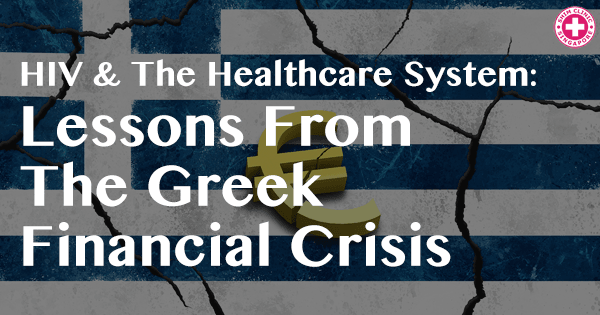Overspending, corruption, and tax avoidance seem to have little to do with HIV rates. In 2012, the world watched stunned as Greece’s economy collapsed. Frantic negotiating with the EU seemed to have rescued the failing state, imposing strict austerity measures on the one prosperous nation.
Greece’s unemployment rose to 20%. In the younger demographic it rose as high as 60%. Cuts across the health system led to the abandonment of non-essential health programs, including the reduction to HIV screening of mothers, the clean needle exchange programs. (Kentikelenis et al., Lancet, Volume 383, No. 9918, p748–753, 22 February 2014).
Suicides and drug use rose. The number of women working in prostitution also rose dramatically (Linda Smith, International Business Times, 1st July 2015).
And HIV rates rose 200 fold.
In this first world country, the crisis saw HIV cut a swath through the disadvantaged population. Drug users injected more frequently rather than smoking or snorting as it gave more bang for their buck and without the clean needle program, HIV passed easily from one to the other in shared needles. Refugees, immigrants and married women, all barred from working legally in the Greek sex work system took to the streets and illegal brothels in a desperate attempt to find work. Lacking the protection of the state system they were open to abuse and HIV reared its ugly head once more.
The health care system was no longer able to afford a supply of antiretrovirals to all who needed them, much less post exposure medication to prevent infection like HIV PEP. Doctors had to be selective in who they were able to help. Those who would otherwise live with the inconveniences of a HIV infection found themselves at the mercy of full blown AIDS.
A shocking and scary truth was revealed. HIV, the plague of the 21st century was not under control as we thought. It was being held at bay with a plethora of government strategies, needle exchange programs, education. As soon as these barriers weakened, the plague surged forward to take new ground.
There is some good news to be found though. The low-cost prevention programs, needle exchange, provision of condoms, education, they are all still working hard, despite financial challenges, to stem this tide. If we can take anything from the tragedy of the crisis in Greece it is that the healthcare system, when given sufficient support, can make a huge difference to the spread of HIV. The cost Greece will incur in five or ten years when the AIDS epidemic makes itself known will well and truly eclipse any savings they have made in not buying clean needles. All these small efforts combine to make a huge difference to the health and well-being of the state as a whole and should be recognized for the good work they do.
References:
Kentikelenis et al., “Greece’s health crisis: from austerity to denialism”, Lancet, Volume 383, No. 9918, p748–753, 22 February 2014
http://www.thelancet.com/journals/lancet/article/PIIS0140-6736(13)62291-6/abstract
Linda Smith, “Greek crisis: Thriving sex industry shows austerity has violated women’s rights” International Business Times, 1st July 2015

